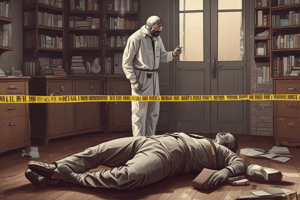Podcast
Questions and Answers
What does the 'dark figure of crime' refer to?
What does the 'dark figure of crime' refer to?
- Crime statistics collected annually
- Crime prevention strategies
- Crimes that go unreported (correct)
- Crimes that are reported to law enforcement
How does most criminal prosecution typically begin?
How does most criminal prosecution typically begin?
- As a result of media coverage
- Following an investigation by detectives
- With a private citizen reporting the crime (correct)
- Through random patrols by police officers
What is the role of the first responder in an investigation?
What is the role of the first responder in an investigation?
- Securing the crime scene and identifying key individuals (correct)
- Performing random patrols to deter crime
- Releasing suspects after questioning
- Conducting a thorough forensic analysis
What defines the legal concept of probable cause?
What defines the legal concept of probable cause?
Which case established the requirement that police use of force must be objectively reasonable?
Which case established the requirement that police use of force must be objectively reasonable?
What is usually the first step in the criminal justice process after a crime is reported?
What is usually the first step in the criminal justice process after a crime is reported?
Which statement about investigation processes is true?
Which statement about investigation processes is true?
Which option best describes the main source of information for the criminal justice system?
Which option best describes the main source of information for the criminal justice system?
Why are both preliminary and follow-up investigations essential in solving crimes?
Why are both preliminary and follow-up investigations essential in solving crimes?
What constitutes an aspect of reasonable force by police during an arrest?
What constitutes an aspect of reasonable force by police during an arrest?
What is the primary purpose of the booking process after an arrest?
What is the primary purpose of the booking process after an arrest?
What constitutes a lawful arrest regarding the use of force by police?
What constitutes a lawful arrest regarding the use of force by police?
What key factor influences a prosecutor's decision to charge a suspect?
What key factor influences a prosecutor's decision to charge a suspect?
During an initial appearance, what is typically addressed by the magistrate?
During an initial appearance, what is typically addressed by the magistrate?
What process typically follows an arrest regarding evidence and charges?
What process typically follows an arrest regarding evidence and charges?
How do modern digital technologies improve the booking process?
How do modern digital technologies improve the booking process?
What happens if a person suspected of a minor offense receives a citation?
What happens if a person suspected of a minor offense receives a citation?
Which of the following statements is true regarding the grand jury process?
Which of the following statements is true regarding the grand jury process?
What right is guaranteed to every arrestee under the Constitution?
What right is guaranteed to every arrestee under the Constitution?
What is a common feature of booking at large municipal agencies?
What is a common feature of booking at large municipal agencies?
What system do more populous states use instead of the grand jury system?
What system do more populous states use instead of the grand jury system?
In federal courts, who represents the government during criminal prosecutions?
In federal courts, who represents the government during criminal prosecutions?
What is the gold standard for moving forward to a criminal trial?
What is the gold standard for moving forward to a criminal trial?
What happens if a defendant stands mute during the arraignment?
What happens if a defendant stands mute during the arraignment?
Why is a judge's determination of a guilty plea being made knowingly and voluntarily important?
Why is a judge's determination of a guilty plea being made knowingly and voluntarily important?
What is typically the most common plea entered by a criminal defendant?
What is typically the most common plea entered by a criminal defendant?
What does a plea bargain usually involve?
What does a plea bargain usually involve?
What is reviewed by the grand jury during the federal criminal process?
What is reviewed by the grand jury during the federal criminal process?
The judge often waits for the results of what report before sentencing in felony cases?
The judge often waits for the results of what report before sentencing in felony cases?
Which of the following is not a key term related to the criminal justice process as discussed?
Which of the following is not a key term related to the criminal justice process as discussed?
Study Notes
Dark Figure of Crime
- Unreported crimes known as the "dark figure of crime" highlight the gap in law enforcement awareness.
- Criminal justice processes initiate only when crimes come to police attention; hence many crimes never enter the system.
Investigation
- Basic investigations begin once a crime is reported, varying from simple inquiries to complex detective work.
- Preliminary investigations focus on securing the scene and identifying victims, suspects, and witnesses.
- Complex cases necessitate follow-ups conducted by detectives, ensuring thorough case handling.
Arrest
- Legal arrests require probable cause, meaning sufficient evidence convinces a reasonable person of the suspect's guilt.
- Controversial use of force is regulated by laws that necessitate "objectively reasonable" force in arrests, as established by Graham v. Connor (1989).
- Deadly force responses are permitted when lives are endangered, distinguishing them from standard arrest protocols.
Booking
- Following an arrest, suspects undergo booking in police holding facilities or jails, depending on jurisdiction.
- The booking process entails recording personal information, photographing, and fingerprinting the suspect.
- Modern digital technologies streamline identification and record-keeping, ensuring prompt and accurate processing.
Charging
- This phase involves police submitting case files to prosecutorial offices for evaluation and decision-making on charges.
- The prosecutor assesses evidence to determine if formal charges should be filed, which may vary by jurisdiction (indictments for some, information for others).
Initial Appearance
- Arrestees have the right to an initial hearing within hours of arrest, ensuring no illegal detention occurs.
- During this appearance, charges are clarified, rights explained, and bail considerations are addressed.
- Federal initial appearances ensure defendants receive legal counsel if needed.
Preliminary Hearing and Grand Jury
- Grand juries assess evidence to determine if probable cause exists for a criminal trial, traditionally without defendant presence.
- Some states utilize preliminary hearings instead, where defendants can attend, ensuring a more streamlined process of determining probable cause.
- Probable cause remains the critical standard to advance cases to trial.
Arraignment
- Defendants formally encounter the charges during arraignment and enter their pleas, with options typically being guilty or not guilty.
- Plea bargains allow defendants to plead guilty for reduced charges or lenient sentencing; over 90% of federal defendants opt for a guilty plea.
- Judges must confirm that guilty pleas are made knowingly and voluntarily, impacting subsequent trial outcomes of the defendant.
Key Terms
- Fundamental terms include: Arrest, Booking, Charging Document, Graham v. Connor, Grand Jury, Initial Appearance, Plea, Probable Cause, and more, framing the criminal justice processes at each stage.
Studying That Suits You
Use AI to generate personalized quizzes and flashcards to suit your learning preferences.
Description
Explore the intricacies of the criminal justice system, focusing on the dark figure of crime, investigation techniques, and the legalities of arrests. This quiz delves into how unreported crimes highlight gaps in law enforcement, the steps taken during investigations, and the regulations surrounding arrest protocols. Test your knowledge on these critical aspects of law and order.




